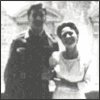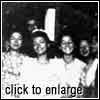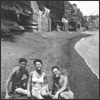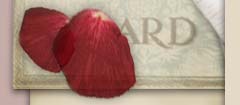Home > War Bride Stories > Anna (Perugini) Lavigne > Page 2 > Page 3
 |
| Click image for larger view.Anna and Aurele on her parent's balcony on their wedding day, June 16, 1946. Photo courtesy of Anna and Aurele Lavigne. |
 |
| Click image for larger view. Anna's Wedding Day in Naples, June 16, 1946. Photo courtesy of Anna and Aurele Lavigne. |
 |
| Click image for larger view. Honeymooners on the Isloa de Procida with Anna's brother. Photo courtesy of Anna and Aurele Lavigne. |
"I remember the first time I met him, he was singing the song Jealousy . It was love at first sight," Anna remembers fondly. From then on in, Aurele was a permanent fixture at the Perugini home. Every day at 5 o'clock he used to come up the stairs to their apartment in Mercogliano, going "tick, tick, tick" as his boots hit the steps.
The young couple courted for 16 months while the Canadians were stationed in Avellino. Then, as the First Canadian Corps was moved to Northwest Europe in 1945, Aurele was ordered to go. Although she wasn't very happy with the separation, Anna used the opportunity of Aurele's absence to learn how to read and write English.
A chaplain, Father Herbert Ghel, C.R., from Kitchener, Ontario, used to come to Anna's home every night and teach her to read English. "When I wrote the letters to Aurele, I used to have the dictionary to find the word and put it down. Every night Father Ghel used to come home and teach me." Her sister Teresa, the English teacher, taught her the "proper way to write".
Aurele spent the next year in Belgium, Holland and Germany, and in June, 1946, he returned to marry Anna in Italy. On the day he arrived in Italy, thieves struck and Aurele lost his luggage, his identification papers, all his money and his wedding suit. Undaunted, he borrowed a suit from Anna's brother and using bands sent from Bathurst, the couple were married by a British Chaplain in a small Naples church on June 16, 1946. Their honeymoon was spent on Procida, a small island off the Italian coast that Anna remembers to this day as one of the most beautiful places in the world.
Soon after, Aurele was repatriated and after some time spent waiting, Anna's brother offered to pay her way to London to catch the war bride ships leaving for Canada. "I was pregnant and then we were talking it all over and my brother said, `Never mind. It would be too long. If you want to go I'll pay your trip to London. When you get to London, you go to the Red Cross and then with all the war brides in London.'"
So with a ticket paid for by her brother, Anna left her family and began the trip that would change her life forever. Travelling by train through Switzerland and France, she eventually arrived in London where she spent five days at a war brides hostel. She recalls that during her wait in London, the Red Cross took the other war brides out on a tour of the city on a double decker bus. From London, she went to Southampton where she boarded the ship The Lady Rodney for Halifax.
Her trip across the Atlantic was uneventful for the most part. She was only two months pregnant so she didn't have to live the nightmare of a mother with small children in diapers. Nonetheless, because she was one of the few Italians on board who knew how to speak English - even limited English - she was unceremoniously cast into the role of ship's interpreter for the other Italian war brides on board.
Anna remembers how the clash of cultures became apparent from the very start. "I understood English more than I was able to speak it. On the ship when they found that out they put me closer to the Italian girl that could not speak or understand English. So I used to be with a group, some had children, babies. These poor babies, crying, and the nurse would say, `time to breastfeed'. I mean here when you breastfeed a child it's private, but there they used to do it right in front of everybody." Much to her chagrin, Anna had to sit and wait for orders from the nurses, which she would then translate to the young Italian wives: "The nurse used to say, `Tell her to do this, and tell her to do that. Tell her to go here. Tell her she has to go to the doctor. Tell her what hour she has to do this!"
Clearly, this was not what Anna expected to be doing on the trans-Atlantic trip!
On November 12, 1946, one day before Aurele's birthday, Anna arrived in Halifax. Aurele was waiting for her there and the two went on to Bathurst. Anna was still not able to speak English fluently, but Aurele's bilingual family did their best and despite the language problems, Anna was welcomed with open arms. It certainly helped that Anna felt she already had a friend in Aurele's sister Jeannette, with whom she had corresponded in Italy.
What surprised her the most about Bathurst was the quiet. "Home it is crowded, lights in the evening. You know, you go to the theatre or to the show or go for a walk, you know on the street, all the people all over the place. Here, there's all these little homes and each one is in their own."
The second thing that struck her as different was the food: "Oh dear, dear, dear, it took me a while... I remember the first night they gave me clam chowder with all these potatoes floating in it. I had never seen molasses, canned beans, lobsters, so I rejected it because I didn't know what it was." Ironically, it was ten years before Anna touched a lobster: now when she goes to Italy she always brings this Maritime delicacy with her, much to the delight of her relatives.
While food and the quiet atmosphere of New Brunswick were relatively easy to get used to, Anna sorely missed the cultural trappings of Italy. "That's what I really missed, the culture, the theatre, the museums. In Italy you go through these little villages, you see churches, beautiful things that are centuries old." Obviously, Bathurst was a shock in that regard, but Anna accepted it. "When I married and came here and I saw, I said `this is it. Now I have to do the best I can.' I accepted it."..Next
Back to Top
|
 |






